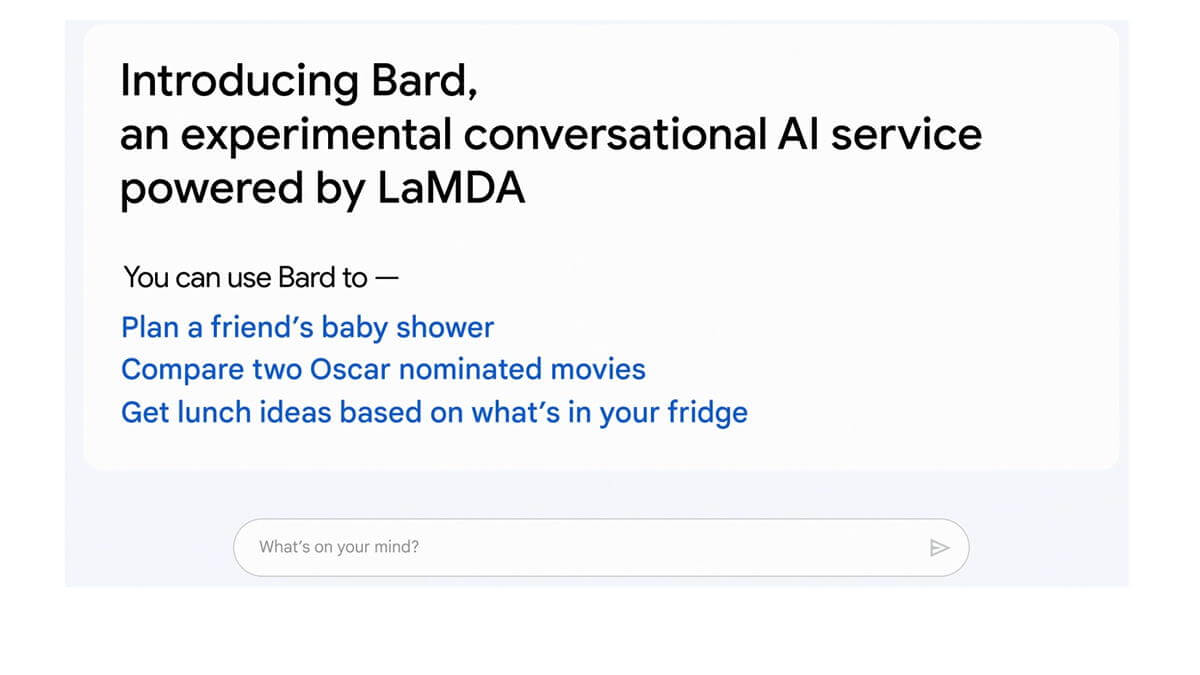Google finally unveiled their response to ChatGPT, in a race to come ahead of the popular AI service funded by Microsoft.
Google’s Bard AI will soon enter beta and will be available to select testers around the world, months after OpenAI’s ChatGPT exploded in popularity.
In a bid to compete with OpenAI, who received a $10 billion investment from Microsoft and will soon deploy ChatGPT to the Bing search engine, Google’s mother company Alphabet recently brought back Sergey Brin and Larry Page, Google’s legendary co-founders.
Now, Sundar Pichai posted a blog announcing Bard AI, which prompted OpenAI CEO Sam Altman to respond. Not two hours after Google’s Bard AI announcement, Altman posted a photo alongside Satya Nadella, the CEO of Microsoft, reminding people that on February 7th Microsoft will hold an event where more ChatGPT details would follow.
So, what is Bard AI?
In short, it’s another generative artificial intelligence solution that works almost exactly like ChatGPT, since indeed many of the people who developed it also worked at OpenAI.
“Use Bard to simplify complex topics, like explaining new discoveries from NASA’s James Webb Space Telescope to a 9-year-old,” says Sundar Pichai in the announcement.
Bard AI vs ChatGPT
Since they’re based on almost the same technology and both were trained on similar data sets (aka most of the text on the web written until 2021 or so), Bard AI and ChatGPT are expected to work in a similar fashion.
First, let’s see how Bard AI works and how it was built.
“We’re releasing it initially with our lightweight model version of LaMDA. This much smaller model requires significantly less computing power, enabling us to scale to more users, allowing for more feedback. We’ll combine external feedback with our own internal testing to make sure Bard’s responses meet a high bar for quality, safety and groundedness in real-world information. We’re excited for this phase of testing to help us continue to learn and improve Bard’s quality and speed,” says Google in the official announcement.
Bard AI is based on the LaMDA model previously revealed by Google
Bard is powered by Google’s large language model LaMDA, or Language Model for Dialogue Applications, which was revealed a few years back and had some controversy around it.
First, Google was under intense scrutiny after the firing of high-profile AI ethicist Timnit Gebru,
who claims they were let go after raising concerns about the risks of generative AI and large language models.
As a recap, Gebru had written a paper outlining their concerns about large language models.
Since those large language models contain all the data they can obtain from the net, they can include large amounts of abusive language, racism, sexism and misinformation that could influence results. Furthermore, large language models similar to Bart AI or BERT, both Google products, need large amounts of energy and have a huge carbon footprint. One study cited in Timnit Gebru’s research found that one type of “neural architecture search” method like the one found in ChatGPT and the like could emit as much as 626,155 pounds (284 metric tons) of carbon dioxide, the equivalent of the lifetime output of five average American cars.
Another issue at Google that delayed Google’s response to OpenAI happened last year, when another researcher employed by the company claimed that LaMDA, their underlying technology, had achieved sentience. His claim that Google’s AI Chatbot is an employee, not property, drew sharp criticism from the AI community, but the new debate probably played a heavy role in Google delaying the launch of their ChatGPT alternative.
Pichai’s announcement of the Bard AI on February 6 did not go as far as to include a timeline for adding Bard AI to Google search.
Instead, the CEO said it will happen “soon” and that it will be a feature helpful for getting a summary of various points of view.
If you were to ask Google if it’s easier to play the piano or the guitar, Bard AI would summarize the answer from multiple sources.
“Soon, you’ll see AI-powered features in Search that distill complex information and multiple perspectives into easy-to-digest formats, so you can quickly understand the big picture and learn more from the web: whether that’s seeking out additional perspectives, like blogs from people who play both piano and guitar, or going deeper on a related topic, like steps to get started as a beginner. These new AI features will begin rolling out on Google Search soon,” writes Pichai.
As you can see, the Bard AI in Google would work exactly like the snippets you see nowadays, only the content you can read isn’t pulled directly from one website in particular but “cobbled” together from the multiple sources listed below.
In our overview of alternative search engines, we listed another tool that works similarly to this and is based on ChatGPT so, if you want a demo of that, check it out.
How ChatGPT works
ChatGPT, being developed by OpenAI, is a similar technology to Bard AI but, since it’s developed by a different company, its data sources and the way they’re curated can differ.
At their core though, they work the same.
“Large language models (LLMs) like the GPT family learn the statistical structure of language by optimising their ability to predict missing words in sentences (as in ‘The cat sat on the [BLANK]’). Despite the impressive technical ju-jitsu of transformer models and the billions of parameters they learn, it’s still a computational guessing game, “ explains Dan McQuillan, a critic of generative AI, in a recent editorial.
He goes on to say that “ChatGPT is, in technical terms, a bullshit generator,” explaining that the generative AI algorithm can only put together sentences that sound plausible but can be inaccurate.
Since the technology can’t actually understand the words it’s stringing together and just sums up or predicts what words would usually follow the initial prompt, it’s prone to “bullshit”.
When it comes to picking ChatGPT or Bard AI for its usefulness or accuracy, at this point it’s impossible to know which one performs best.
You could say ChatGPT is the better generative AI since, for months now, it’s been refined thanks to millions of people testing it. You could also say that Bard AI is the better chatbot, since it will launch later and theoretically could have access to data newer than 2021, whereas that’s where ChatGPT’s sources end.
We’ll update this story with more relevant information as soon as it develops.
Follow TechTheLead on Google News to get the news first.































